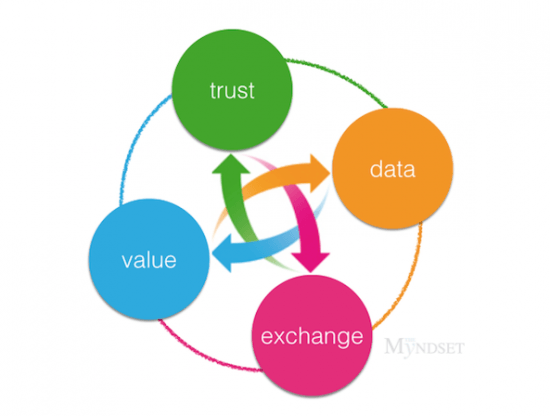Most of the corporate finance and marketing courses that I followed in business school back in 1992-3 talked about the need to extract value from one’s activities. It is a founding principle of great branding that says that marketing is the art of adding value. Do a quick google on “extracting value,” meanwhile, and you will find innumerable code-related references to extracting value from data. Applied to consumers, it is often about extracting value from a customer database. Many companies [and most older executives] have been programmed to extract value and, for those that are publicly traded, returning the value to shareholders. Private equity firms and Wall Street, in general, are driven by the ability to identify ‘value’ that can be pumped up and, more or less, sucked out. This mindset has necessarily been called into question with the advent of the connected consumer. As I wrote back in 2010 about the Marketing of the 5Es, I believe that exchange is one of the bedrocks of the modern marketing mindset.
Value exchange
Rather than extracting value, the more enlightened choice is to exchange value. What is the customer gaining in exchange for his/her data and loyalty? What is the employee getting in return for his/her commitment? In my days running Redken, I was in awe of the genius of the Redken Education principle, which really turned the principle of teaching on its head. Rather than teacher tell student, the Redken Education philosophy was (and remains) about an exchange between teacher and students. The name of the Redken training facility is called the Redken Exchange (right) with good reason. If education can be designed around the principle of exchange and create mutual value, I firmly believe the same can be said and done with marketing and leadership. ♺!
Transparency underwrites trust
Brands are not the sole property of the shareholder, but are co-owned with the customers. Customer data is of bankable value, but its exchange needs to be based on trust. In this context, brands and their sales and marketing teams need to consider the importance of exchanging data, promises and value in an effort to build a reliable relationship. When presented with soft concepts such as exchanging value – as opposed to extracting value — management teams have a challenge to unlearn the older precepts. The indoctrination of chasing return on investment is all about extracting value. Whereas, by adopting a posture of sharing and value exchange, customers and partners are more likely to construct stronger bonds. Underwriting this exchange is a necessary high degree of transparency.
Transparency is to trust what the gold standard is to currency. {Please tweet ♺!}
Relationship building
By switching from a value extraction to value exchange mindset, brands will inevitably gain longer-term loyalty from their customer base. The same should be said for how companies hire and retain employees. By considering one’s workforce as manpower that needs to be worked as hard as possible, companies tend to be focused on extracting the most from their employees. There could be much more to gain by understanding and nurturing how the job is more than a list of tasks and paycheck at the end of the month for the employees. The more employees understand and appreciate what the work is bringing to them and their lives (beyond long hours and a salary), I would argue the greater the engagement and payoff.♺!
To my thinking, this mindset should not be limited to just consumer brands. Even companies in financial services and resource extraction (gold, oil…) — which are mostly built on value extraction — could do well to adopt a value exchange posture.♺!
What do you think?












